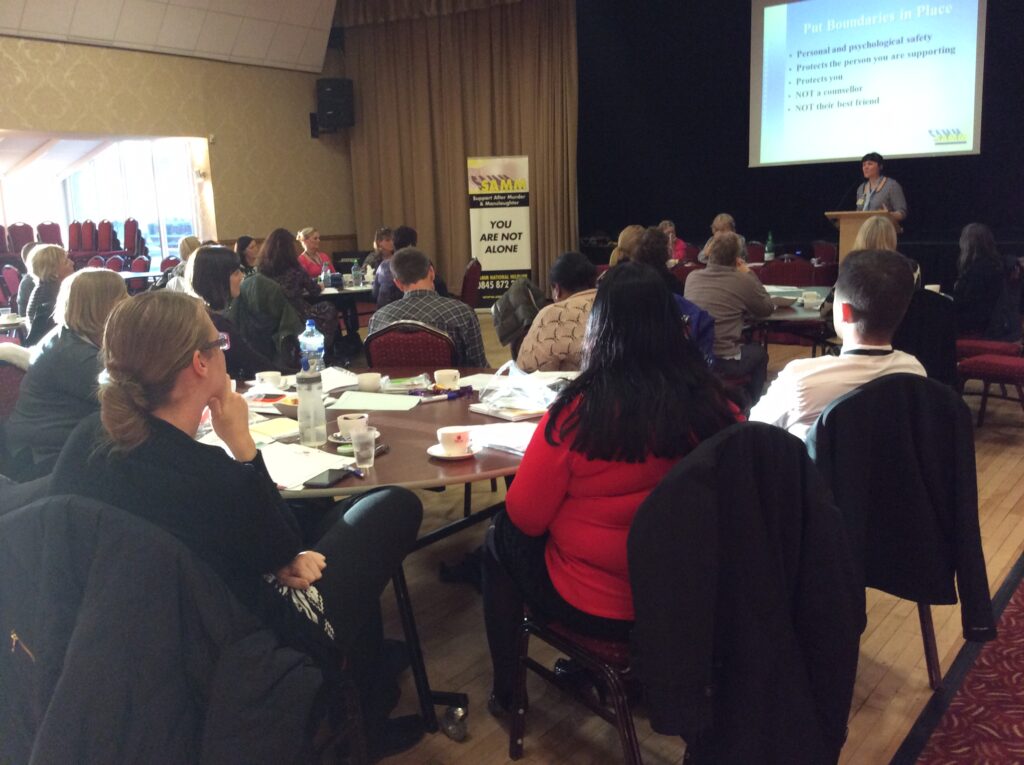Training for the Professional
SAMM provides training for people who come into contact with those bereaved through homicide. We offer various approaches to best support them while looking after your own personal and professional wellbeing.
Our training is also suitable for those dealing with a sudden death.
The aim of the training session is for you to be able to develop appropriate responses and engagement with families bereaved suddenly and traumatically.
Our expected outcomes are for you to:
- Have awareness of how different personalities and sometimes genders can grieve differently.
- Describe the effects of stress both psychologically and physically and its relation to sudden bereavement. Its effects on a client’s concentration and ability to retain information.
- Identify different psychological effects on bereaved people with whom you are working.
- Describe the initial effects of traumatic grief.
- Identify the on-going and lasting effects of traumatic and complex grief including PTSD.
- Recognise the effects of traumatic bereavement on relationships within families, communities and work colleagues. Family dynamics and communication and language.
- Explore awareness and effects of judgemental attitudes when dealing with bereaved families.
- Identify difficulties for the bereaved family when dealing with the media.
- Outline what services are available for families and what peer support can achieve.
- Differentiate between professional and peer support.
- Show an increased understanding of the structure of SAMM and its aims.

Further to this we explore some practical issues such as:
- Financial implications of homicide.
- Importance of accessing the body.
- Delayed funerals and how families deal with this.
- How families deal with multiple post mortems, the trial, appeals, parole hearings and acquittals.
- How families perceive the justice system and agencies.
- The importance of the Police Family Liaison Officer (FLO) in the process of the investigation and support of the family.
Future training opportunities: Supporting people after traumatic bereavement
An online Zoom training session for people working within and connected to bereavement and emergency support services.
Examples of Feedback on our training:
“The personal element gives a real sense of the gravity and long lasting effect of murder.”
“Understanding the potential effect of the trauma on the mindset and memory of the bereaved.”
“Hearing your personal experiences is an extremely powerful way to help us understand how we can best approach and support future clients. The top tips you have shared are also invaluable.”
“Lots to think about how families receive and retain information when going through trauma and how I could address this.”
“Thank you for being so open about your experiences. I could also relate to how children deal with bereavement. It is something I experienced.”
“Very useful. Both presentations you gave some thought provoking issues when considering dealing with bereaved families.”
“The input was just right as was the content. It was well explained and clearly from the heart.”
“It was very valuable to hear direct experiences. We have had inputs from other professionals but it is excellent to hear your side. Thank you so much.”
“I feel very aware now of the victims and being mindful of their needs, no matter how big or small.”
“Real experiences/stories. Practical tips of what to say and what not to say. Insight into how SAMM supports bereaved families.”
“Discovering that SAMM exists and what they offer to families. Insight into the reactions of the bereaved and their feelings.”
“Useful tips especially communication/practicalities. Insight into difficulties /feelings/expectations of families. Overview of stages of grief/stress reactions.”
We are happy to discuss individual training needs and can tailor a session to suit your particular group.
Please contact the SAMM office by calling 0121 472 2912, or info@samm.org.uk.
Previous training has been provided to:
- Police Officers (including FLO’s SIO’s and other police officers)
- Crown Prosecution Service (CPS)
- Barristers
- Probation Officers
- Schools
- CBUK
- Relate and other counsellors
- Funeral directors
- Intensive care staff
- Fire and Rescue
- The Foreign and Commonwealth Office, including international training
- IOPC
